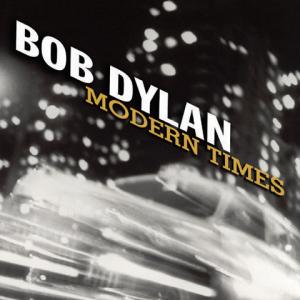
Modern Times (2006)

1. Thunder on the Mountain
2. Spirit on the Water
3. Rollin' and Tumblin'
4. When the Deal Goes Down
5. Someday Baby
6. Workingman's Blues #2
7. Beyond the Horizon
8. Nettie More
9. The Levee's Gonna Break
10.Ain't Talkin'
By the time Modern Times arrived in 2006, few could have predicted that Dylan, now well into his sixties, would produce an album that not only rivaled his best work of the past but, astonishingly, topped the charts. In retrospect, perhaps we should have seen it coming. Modern Times followed the critically revered Time Out of Mind and the exuberant Love and Theft, and yet it doesn’t merely continue a late-career renaissance—it expands it.
The packaging, with its monochrome photograph and minimalist design, evokes a bygone era—early 1960s at a glance—but musically, this album doesn’t look back to folk or protest. Rather, it dives headfirst into the warm waters of pre-rock popular forms: swing, jump blues, ragtime, and early jazz. The result is not a pastiche, but a reinvention. Dylan isn't mimicking; he's inhabiting.
The opener, Thunder on the Mountain, with its propulsive rhythm and playful lyrical asides (including a nod to Alicia Keys of all people), signaled something refreshingly odd: Dylan was embracing a looser, older musical language, and somehow making it sound not only relevant, but essential. That the track was later used in an iPod commercial was, if anything, poetic irony—modern branding selling timeless sound.
Instrumentally, the album is lush but never overbearing. The band—tight, road-seasoned, and deeply attuned to Dylan’s phrasing—slides effortlessly through genres. There’s a palpable looseness to the sessions, a kind of spontaneous elegance that feels lived-in rather than labored. The arrangements are ripe with dancehall warmth, the kind of music one imagines drifting from the radios of 1930s sedans or the smoke-filled corners of roadside juke joints.
Vocally, Dylan remains unmistakably himself—gravel-voiced and phrasing like a beat poet in a bar band. But there's an ease here, a slyness, and occasionally a softness that complements the musical backdrop. He sings not as a prophet or a protestor, but as a man weathered by time, amused and bemused in equal measure.
Lyrically, Modern Times sidesteps the grand pronouncements of earlier decades. The political polemics are gone, replaced by a more personal, wry worldview. This is Dylan as itinerant musician, philosopher in the margins, a man more concerned with existential punchlines than with manifestos. And it works. Even tracks that stretch past the six-minute mark retain their vitality—each lyric a small wink or shrug from a narrator who’s seen too much to care and heard too much to stop talking.
Modern Times is one of those rare Dylan records that transcends the boundaries of his core audience. While many of his albums feel designed primarily for longtime devotees, this one has the curious charm of accessibility. It’s both familiar and strange, modern and ancient—a true achievement in both concept and execution.
That it reached No. 1 on the charts wasn't a fluke. It was recognition, perhaps belated, that Dylan hadn’t just aged well—he had somehow kept moving forward by reaching deeper into the past.
Go back to the main page
Go To Next Review